|
At the Origin of the Christian Claim Reason and the Christian "Claim" at the UN The English translation of the second volume of "PerCorso" is presented at the UN. A cardinal, a rabbi, a Moslem, and a Lutheran pastor face to face. At a confused and uncertain moment in time, a brilliant and persuasive example of dialogue between positions that are different, but all authentically human. Real ecumenism |
|

"The passion for the event of Christ which has been the defining experience of my life makes me profoundly grateful to His Excellency, Archbishop Martino, and all those who are giving me this possibility for a dialogue today, especially to His Eminence Cardinal O'Connor. In this dialogue I would like to share with you the wonder that, vibrating at the heart of my existence, has made it possible for me to grasp the profound rationality which moved me as a man, characterizing in this way the value of the relationship between myself and God."
These words of a message sent by Father Giussani inaugurated the meeting in New York on May 24th. In the Dag Hammarskjold Auditorium at the UN, packed with people, the Permanent Observer of the Holy See to the United Nations, His ExcellencyArchbishop Renato Martino had organized, in collaboration with Communion and Liberation and the Path to Peace Foundation, the presentation of a new book by Father Giussani, At the Origin of the Christian Claim. Published by McGill-Queen's University Press in Montreal, the text is introduced by David L. Schindler, a disciple of the great theologian Hans von Balthasar and Professor of Fundamental Theology at the John Paul II Institute for Studies on Marriage and Family in Washington, D.C. 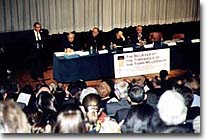 December 11, 1997
December 11, 1997This was the second time that a book by Giussani had been presented at the UN: In December 1997 David Schindler, Shingen Takagi, and David Horowitz had discussed The Religious Sense, also at that time invited by Nuncio Martino. The presentation was an unforeseeable event-it is God who makes everything, out of nothing-and a "new beginning" for all of CL. That afternoon at the UN gave rise, in the ensuing months, to a number of similar events all over the United States. For many of the people attending them more or less by chance-from Washington to San Francisco, from Houston to Boston, from Chicago to Rochester-The Religious Sense is no longer only a book, but the beginning of a story on the road marked by Christian friendship, lived according the charism of CL. If that first lecture in 1997 was a surprise, even more so was the second one reported here. In the UN building, talk was of the name that, above all names, gives a face to the Mystery, ensuring unity among men and peoples that is otherwise impossible: this Jesus of Nazareth who initiated a story and guarantees its development in time by the same method-the experience of an encounter, in the present. At the Origin of the Christian Claim, as many know, intends to show how one becomes a Christian even today; that is, how the encounter comes about with the exceptional humanity of the Jew Jesus of Nazareth, and how a depth of certainty grows over time-in those who are reached by the event of God made man and adhere to it with all the energy of their reason-just as happened for John and Andrew. 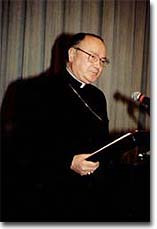 Martino
MartinoNuncio Martino, for more than ten years now the Holy See's indefatigable representative to the United Nations, highlighted the current, up-to-date nature of the encounter at the UN: "One of the characteristics of the modern world is the loss of wonder, the dissipation of Mystery. The world we inhabit tends to be flat, predictable, explainable, and at times we Christians can be frustrated by our inability to make the world understand what we believe and why." For this reason, Martino explained, the "Christian claim" emerges forcefully in all its value, at once a challenge for the world and a proposal to the human heart. "The central mystery of our faith is the Incarnation. As with Paul the Areopagite, this is the announcement that Jesus died and rose again and will come to judge the world." And just as then, so also today because of prejudice "for many-and sometimes even for believers-it is unacceptable that God can penetrate into the ordinary circumstances of life. Faith does not depend on an effort of ethics or the imagination, because it is Mystery itself that makes itself known by entering into history. For this reason Christians take concrete humanity into serious consideration." 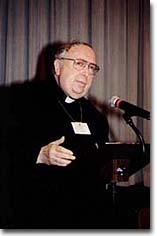 Albacete
AlbaceteBefore Archbishop Martino spoke, Lorenzo Albacete, as chairman, introduced the seminar: "The Christian claim, argues Msgr. Giussani, is based on the experienced perfect correspondence between the event of Christ and the most profound aspirations of the human heart. The 'passion for the event of Christ' coincides perfectly with a 'passion for the human,' since, as he writes in the book, 'No force of energy and no paternal or maternal loving tenderness has ever impacted the heart of man more than the words of Christ, impassioned as He is about the life of man.' (At the Origin..., p. 84) It is this same passion for the life of man, as we have heard, that Msgr. Giussani wishes to share with us today." Real ecumenism The seminar was deliberately ecumenical in its choice of speakers: In turn at the podium were Cardinal John O'Connor, Archbishop of New York; Rabbi Niel Gillman, Director of the Department of Jewish Philosophy at the Jewish Theological Seminary in New York; and Dr. Razan A.G. Farhadi, Ambassador of the Islamic State of Afghanistan to the UN. The Lutheran pastor Rev. Gilbert C. Meilaender, Director of the Institute of Christian Ethics at Valparaiso University in Indiana, blocked by bad weather, forwarded his address to be read. 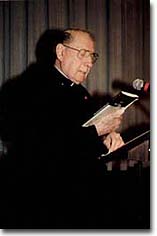 O'Connor
O'ConnorCardinal O'Connor recalled his friendship with Msgr. Giussani and emphasized the profundity of the book that has just been published, "one hundred pages dense with content. It is a demanding text, rich and profound, written by a man whom I deeply respect, a friend who knows how to build. These are pages in which Giussani has gathered the results of his deep investigation of the nature and dynamics of the relationship between God and man through the figure of Christ." The Cardinal then indicated the heart of the Christian announcement: "Mystery entered into this world, but where are we with in relation to the Mystery which makes itself present? At this level what is at stake is our humanity, the possibility of being truly human. Christ is the true humanity and faced with His question, 'Who do you say that I am?,' we must all take a position." And this, concluded the Archbishop of New York, "is the meaning of the Christian claim. Christianity is the announcement that a man, Jesus of Nazareth, is God and that this is a reasonable hypothesis." 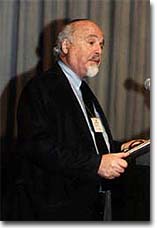 Gillman
GillmanRabbi Gillman stated that he spoke as a practicing Jew, as a rabbi, and as a theologian. "This means, primarily, that at the core of my religious identity is the conviction that God's covenant with Israel is eternal, unshakable, and irreplaceable. Standing before you, then, is a Jew who reads Msgr. Giussani's writings through Jewish 'spectacles'." Gillman then confessed a discovery that aroused his enthusiasm: "My very first reaction upon reading the two books [The Religious Sense and At the Origin of the Christian Claim] is to recall the writings of my late teacher, Rabbi Abraham Joshua Heschel [1907-1972, American religious thinker of Polish Jewish origin]: Man is Not Alone and God in Search of Man. Note the parallel with Msgr. Giussani's two volumes: in each case, the first volume deals with the religious claim in general, and the second, with a particular religious claim, the Jewish or the Christian." Rabbi Gillman said that for both-Heschel and Giussani-"God's presence is in and beyond all things. It is, Heschel claims, 'an ontological presupposition'." As to the difference between the two, Gillman identified it as the fact that "Msgr. Giussani is devoted to demonstrating that Christianity represents the supreme exemplar of God's entering into the realm of human history. Heschel's goal is to demonstrate the enduring power and relevance of the Jewish claim that it is God's relationship with Israel that serves as the exemplar of God's pathos." And in a manner "more significantly, they also part company on what Giussani claims is the 'crime'-his word-that rests in the Christian claim that 'I am the religion, the one and only way'" to God. "Heschel does not think this about Judaism. For Giussani, the primary and ultimate site of God's revelation is in the person of Jesus. He traces, with great precision, the gradual emergence of Jesus' own answer to the question 'Who is he?' Only shortly before his death does he identify himself as 'son of God'." But the true scandal, Gillman continued, is the fact that "Christianity came to believe that God was incarnate in a single human being. That was both its unique contribution to our understanding of God's revelation and, at the same time, its greatest vulnerability: the constant temptation to worship the image in place of God." But this criticism reaches right to the unrenounceable foundation of the Christian fact, handed down by two thousand years of tradition: the announcement that in the Jew Jesus of Nazareth, who died and rose again, sign and Mystery coincide. "Finally, what Msgr. Giussani has accomplished superbly well," Gillman concluded, "is to present us a powerful apologia for Christianity, a rigorous defense of the Christian faith. However, it is not my claim, nor is it my truth. But it is precisely those differences in our perceptions that make theological exchange between our communities so necessary. We can thank Msgr. Giussani for encouraging that debate." 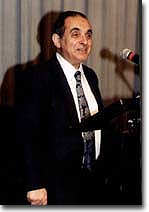 Farhadi
FarhadiAfghan Ambassador Farhadi took as his starting point the question, "Is the human effort the source of faith or rather does God make Himself known to the human being?" The answer to this question would be a great contribution to the attempt to locate the position of the believer on the threshold of the third millennium. Msgr. Giussani offers a response: in Christianity it is Mystery itself that makes itself known by penetrating and dominating history. In this book, the Afghan ambassador continued, "The human being is described as discovering himself in the presence of the mystery because he has already been invited and attracted by the hidden attendance of the mystery itself. Let us recognize that while Msgr. Giussani remains in a Christian line of theology, he proposes certain innovative ways of argumentation." Farhadi appreciated the fact that "Msgr. Giussani refers to Abraham in many parts of his book when Abraham is being asked by God to sacrifice his son, making him the paradigm of the drama of man in his full stature." Meilaender In his talk, which was read by Chris Bacich for the reason noted above, the Lutheran minister Meilander stated that he shared Father Giussani's formulation of the Christian problem: "This Event which lies at the origin of the Christian claim overturns, reshapes, and restructures our understanding of the religious sense of humanity. For this Event- hen in Jesus God takes human life into his own divine life-is not the conclusion of our search, nor is it the conclusion of a philosophical argument. It is simply there for us to reckon with. For Father Giussani that is why the encounter with Jesus of Nazareth is so crucial: it is the event in which God Himself makes for us the way to God. For what is offered here, on Giussani's account, is the possibility of being human, of acquiring a human face. Drawn into personal relationship with Jesus, as were the first followers, we ourselves become, for the first time, fully human. The Christian claim that God meets us in Jesus is not, first of all, an argument that demands our assent. He is not imprisoned in the past, a knowledge that cannot be reached by deduction. The Christian claim is that Love has become one of us, and that we are called, therefore, to entrust our lives to this Love." At the end of his talk Meilander said that "everyone is searching for Jesus. Ultimately, it is only in light of the answer that we learn how to ask our question. That, at any rate, is what Father Giussani believes we can learn at the origin of the Christian claim." A brilliant and persuasive example Concluding the seminar, Albacete recalled, "Our motivation today, here at the UN, is that passion for the human that, through the charism of Msgr. Giussani, characterizes the experience of the encounter with Christ in our Movement. We earnestly desire that this commitment to human solidarity characterize the celebration of the two thousandth anniversary of His birth that we are preparing to celebrate. In Msgr. Giussani's words at the end of At the Origin of the Christian Claim, "Destiny has not left man alone. It is an event which was announced throughout the centuries, and which reaches us even today. The real problem at hand is that man recognize it with love." At a confused and uncertain moment in history, this encounter in New York was a brilliant and persuasive example of a dialogue between cultural and religion positions that while different, are all authentically human and committed to a search for answers to the demand for truth, beauty, goodness, justice, and happiness which vibrates in the heart of the man of reason. "Thus, on the threshold of the third millennium, believers," said Papal Nuncio Martino, "can work together for a more just society and one that is at peace." |